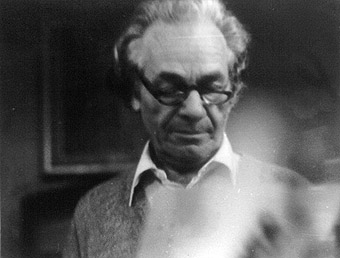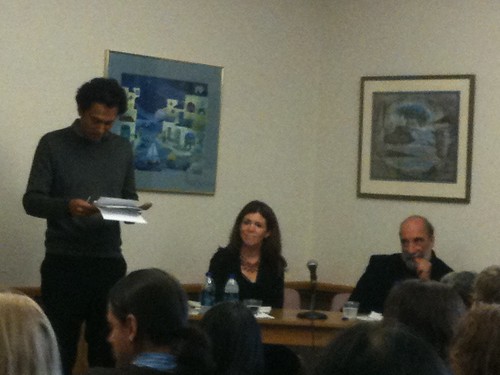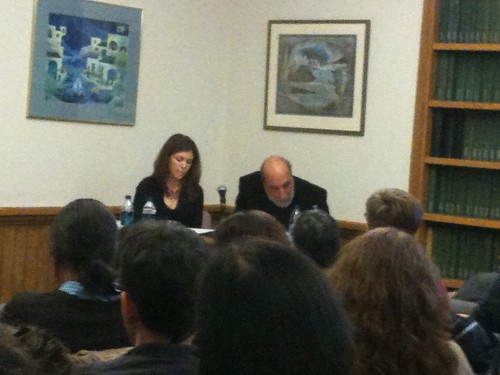Congratulations to this year's winners of the Pulitzer Prizes for
Letters, Drama and Music! I was especially gladdened by three of the winners in these areas.
Kay Ryan, for long an unacknowledged stylist of the first rank, received the Pulitzer Prize for Poetry for her collection
The Best of It: New and Selected Poems (Grove Press).
Jennifer Egan, a consistently outstanding writer, received the Pulitzer Prize for Fiction for her novel,
Welcome to the Goon Squad (Alfred A. Knopf), which includes the inventive use of MS PowerPoint slides. And
Eric Foner, whom I met personally many years ago when a good friend was a post-doctoral student at the university, received the Pulitzer Prize for History for his nuanced portrait of
Abraham Lincoln's affective and political evolution on the issue of race and racism,
The Fiery Trial: Abraham Lincoln and American Slavery (W. W. Norton & Co.). Other winners include the provocative Chicago-area playwright
Bruce Norris, who received the drama prize for his playful take on
Lorraine Hansberry's (1930-1965) landmark 1959 work
A Raisin in the Sun; the
New York Times's
Dave Leonhardt, easily one of their best writers, who has provided some of the soundest commentary on the unfolding financial crisis; and
Jesse Eisinger and
Jake Bernstein of
ProPublica, a New York-based non-profit research and investigative journalism organization that has, since its founding several years ago, demonstrated the best of what journalism can do. It also becomes the first online journalistic organ to win 2 Pulitzer prizes, having won the first by any online publication last year.
***
Roberto Bolaño (1953-2003). A name anyone even modestly knowledgeable about contemporary global literature would be passingly familiar with.
Chilean native Bolaño's fame was already waxing, his esteem as a writer in the Hispanophone literary world among the highest of his peers, when he passed away just 8 years ago. During 10-year period from 1993 to 2003, when he published some 14 or so books in just 10 years (8 novels, 3 collections of stories, 2 collections of poetry, and 1 collaboration), recognition of his genius built and approached its apogee. The year he died, US publisher
New Directions published one of his masterpieces, the strange and remarkable novel
By Night in Chile (
Nocturno de Chile, 2000), translated by Chris Andrews, and his American acclaim began; since then, it has continued to ascend.
Between New Directions and
Farrar Straus & Giroux, nearly all of his work in prose, large and small, has or will be translated; a number of the stories, collected in
Last Evenings on Earth (selected from
Putas Asesinas [Killer Whores], 2001 and
Llamadas Telefónicas [Telephone Calls] 1997), and two novels in addition to
By Night in Chile,
The Savage Detectives (Los Detectives Salvajes, 1998) and
2666 (2004), have anchored his reputation as one of the most extraordinary and inventive fiction writers in any language, and the latter novel is astonishing in its vision and aesthetic daring, offering writers of today new possibilities for what a novel might do, and how it might do so. In all of these works, a constant is the character of the poet; in each of the novels I've mentioned, poets are central to the plot; often they're protagonists, sometimes villains. Even when not overtly depicted or only casually so, poets are frequently the source, in part, of the fiction's thematic core, its aesthetic self-regard, its narrative drive. This was not a random element of Bolaño's work, but derives from the writer's own history and story, as a poet early in his career. Such has been the case for many a great fiction writer: immediately
William Faulkner, James Joyce, Samuel Beckett, and
José Saramago come to mind. All wrote poetry early on, but came to great fame as fiction writers (in Beckett's case it was also his dramaturgy).
Recently I was listening to a podcast with one of his translators,
Natasha Wimmer, who beautifully brought
2666 into English, and I believe she stated that he was not a very good poet. Or perhaps that was
Hector Hoyos in conversation with
Robert Pogue Harrison, on the latter's intellectual chatfest,
Entitled Opinions. Maybe they both expressed this opinion, that Bolaño was
not a very good poet, perhaps even a bad poet. I beg to differ. His poems often seem like seeds for later works, but they have tremendous energy, more metaphorical richness and inventiveness than a good deal of contemporary American poetry, and are often quite funny and provocative, in multiple ways. I sometimes wonder if critics say such things just to say them--especially if they are not creative writers themselves--or if they truly believe them. I have read a lot of poetry, and Bolaño's is "bad." I think his fiction is better, and both are better than his essays, one of which, "Exiles," containing incorrect statements and problematic assumptions,
is now available for reading on the
New York Review of Books' website. Few can do it all, but Bolaño was and died a poet, even if his greatest and most sustained achievements are in prose fiction. The heart and ear and eye of the poet, this particular poet named Roberto Bolaño, is evident in all of his finest work. Here is a poem from the collection
The Romantic Dogs (
Los Perros Románticos: Poemas 1980-1998, 2000), translated by Laura Healy and published in the US in 2008.
First the Spanish, with its particular rhyme scheme, then the English, which, though quite different approximates something nevertheless lyrical.
BÓLIDO
El automóvil negro desaperece
en la curva del ser. Yo
aparezco en la explanada:
todos van a fallecer, dice el viejo
que se apoyo en la fachada.
No me cuentes más historias:
mi camino es el camino
de la nieve, no del parecer
más alto, más guapo, mejor.
Murió Beltrán Morales,
o eso dicen, murió
Juan Luís Martínez.
Rodrigo Lira se suicidó.
Murió Philip K. Dick
y ya sólo necesitamos
lo estrictamente necesario.
Ven, métete en mi cama.
Acariciémos toda la noche
del ser y de su negro coche.
ROADSTER
The black automobile vanishes
around the curve of being. I
appear on the esplanade:
everyone will die, says the old guy
leaning against the façade.
Stop telling me stories:
my path is the path
of snow, not of seeming
taller, handsomer, better.
Beltrán Morales died,
or so they say,
Juan Luís Martínez died,
Rodrigo Lira killed himself.
Philip K. Dick died
and now we only need
what is strictly necessary.
Come, slip into my bed.
Let's caress all through the night
of being and its black car.
From
The Romantic Dogs, New Directions, Roberto Bolano © 2008. Translated by Laura Healy. All rights reserved.














